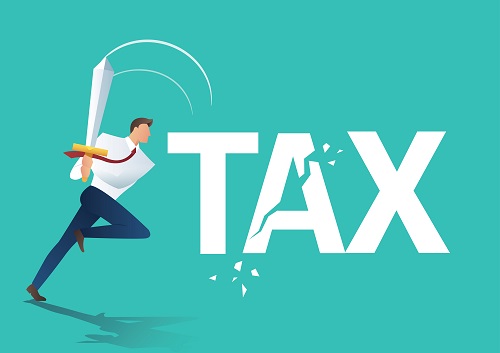Ways to Save Tax on Your Salary
27-May-2021 |
You work hard all through the month to finally receive that paycheck. However, you end up paying a significant sum as income tax on salary, which reduces your paycheck sum. The Income Tax Department levies tax on salary in India as per the applicable slab rate. It is possible to reduce the income taxes on salary if you are more cautious and make wise investment decisions in a year. By choosing the right salary structure and opting for smart investments such as insurance plans, you can save a lot of your earnings annually which provide security for your loved one.
Saving tax on salary in India
- Restructure your salary: As a general tendency, you pay more attention to your overall CTC and forget about your salary structure. You might not have your entire salary under your control, but you can control the way your salary is structured to minimise the income tax on salary. Typically, your salary comprises four components – basic, allowances, perquisites and retirement benefits/contributions. Your basic salary or your take-home salary is fully taxable. Hence, if you keep a high portion of your earnings under this head, you might be taking home a large sum, but you will also pay high taxes.
Standard deduction of Rs. 50,000/- was provided by Budget 2019, due to which individual allowance such as transport and medical reimbursement was eliminated. Further, you can lower your tax burden by opting for more perquisites in your salary structure and contributing more towards your retirement savings such as NPS (National Pension Scheme) and PF (Provident Fund).
- Get home loan tax benefits: If you have a home loan, you can reduce the income tax on salary. Multiple government schemes, such as Pradhan Mantri Awas Yojana, work towards making housing more affordable in India. Further, Section 80C of the Income Tax Act, 1961 offers tax deduction up to ₹1.5 Lakh for repayment of home loan principal amount. Also, Section 24(b) grants tax exemption on home loan interest up to ₹2 Lakh annually.
If you put a newly bought property on rent, the interest on the home loan acquired on the new house can be set-off against the rent income.This will allow you to save a significant sum of your salary.
- Claim exemption for rented premises: Section 10(13A) of the Income Tax Act gives you tax exemption under the HRA (House Rent Allowance) head, provided you stay in a rented home. Your HRA is calculated as the minimum value of three components – annual HRA, 50% and 40% of the annual salary in case of metro and non-metro city residence and 10% of basic salary. If your monthly salary is exclusive of HRA, you can avail of the annual rental exemption under Section 80GG.
- Apply for the right tax regime: The tax regime you choose also greatly impacts your tax amount. In Budget 2020, a new tax regime was introduced where rates were slashed. Tax slabs were redesigned for individual taxpayers who opt for no deduction and exemptions.
As a taxpayer, you have two options, you can continue to pay taxes as per the previous tax regime or opt for the new tax regime without any tax exemptions and deductions. You should decide which out of the two regimes is best as per your salary and financial situation. For instance, if you earn an annual salary of ₹8 Lakh or ₹10 Lakh per annum, you can save more in the new tax regime as compared to the old one.
Particulars |
Income Tax as per Old Tax Regime (in ₹) |
Income Tax as per New Tax Regime (in ₹) |
Annual Salary |
8,00,000/10,00,000 |
8,00,000/10,00,000 |
80C Deductions |
1,50,000 |
NIL |
Net Taxable Income |
6,50,000/8,50,000 |
8,00,000/10,00,000 |
Net Income Tax (as per the applicable tax slab rate)
*exclusive of health and education cess |
75,400/85,800 |
46,800/78,000 |
- Undertake wise investments: A great way to save tax on your salary is to invest your money in sound investment options and declare them annually to get the tax benefits. Capital market and government-mandated scheme investments offer high returns, enabling you to accumulate a large wealth as well as save taxes.
With these tactics, you can easily reduce tax on salary in India. However, it is important to be careful when choosing your tax-saving investment instruments and structuring the components of your salary.

One of the most coveted investment options is a ULIP (United Linked Insurance Plan). A ULIP policy offers the dual advantage of insurance and investment in a single plan.
In a ULIP plan, a part of the premiums you pay is used to provide you with a secure insurance cover, whereas the remaining premiums are invested in a market fund as per your preference, financial objective and risk tolerance.
Apart from high ULIP returns, you also get substantial taxation benefits. Under Section 80C, the premiums you pay for the policy are exempt from tax up to ₹1.5 Lakh. Further, under Section 10(10D), the death benefit and the maturity proceeds of the ULIP plan, including the ULIP returns, are exempt from tax, subject to fulfilment of specific conditions.
That said, ULIP policies from Tata AIA Life Insurance allow you to pay your premiums as per your desired frequency – single, annually, semi-annually, quarterly or monthly. This eases your financial burden as you can opt for a frequency that suits your financial needs and still get the same tax benefits.
With the TATA AIA Life ULIPs, you enjoy the growth of your investment with market-linked returns along with a benefit of an insurance cover. The plans give you the flexibility to invest in a variety of funds as per your investment needs and risk tolerance. You also get loyalty additions in your fund over time.
Such investments help you avail taxation benefits in the present while also give you dual advantages of an insurance cover, along with long-term returns on your investments.
It is advisable to begin your tax planning process earlier in the year to ensure you save as much as income tax on salary as possible.
L&C/Advt/2021/May/0662







 FOR EXISTING POLICY
FOR EXISTING POLICY 
 FOR NEW POLICY
FOR NEW POLICY 




